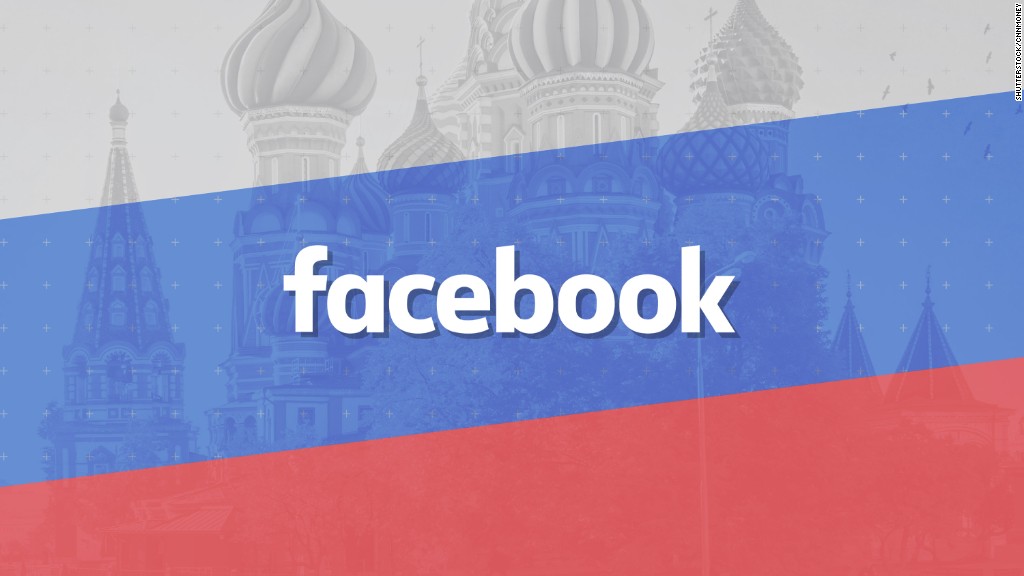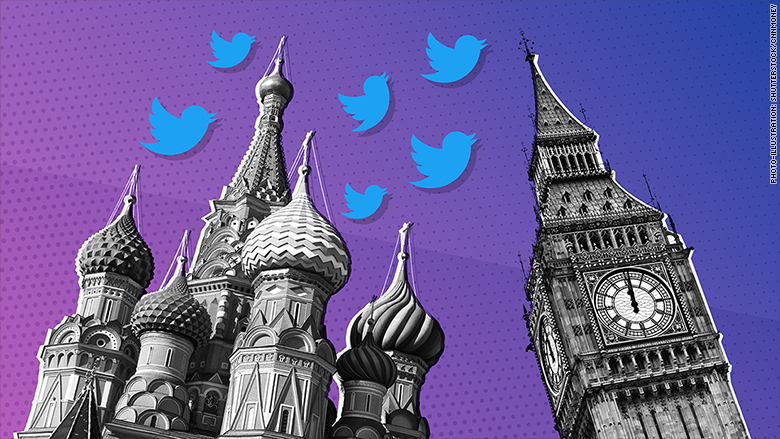
A network of Twitter accounts with ties to the Russian government-linked troll army that meddled in U.S. politics posted dozens of pro-Brexit messages on the day of the referendum on the United Kingdom's membership of the European Union in June 2016, a CNN analysis has found.
The tweets, which were accompanied by popular referendum-related hashtags, mocked the pro-European Union campaign's warnings of the consequences of a vote for Brexit, and targeted then-British prime minister David Cameron, who had campaigned for his country to stay in the EU.
This is the first instance of coordinated pro-Brexit tweeting confirmed to have come from the Internet Research Agency. Other news organizations have identified accounts from people posing as American conservatives who posted some tweets in favor of Brexit, which fit the invented personas of those accounts. But the Russian accounts CNN identified as posting about Brexit were not nearly as elaborate as those, and were pretending to be from countries other than the U.S. or U.K. Their value appears to have come from a short-term play: Increasing their activity on the day of the vote in order to push pro-Brexit memes to people looking at neutral hashtags about the referendum.
The accounts CNN identified were among more than 2,700 accounts Twitter handed over to the U.S. House Intelligence Committee as part of its investigation into Russian meddling in last year's U.S. presidential election. Twitter provided the details of the accounts to Congress after the social media giant identified them as tied to the Internet Research Agency, a troll army in St. Petersburg with links to the Kremlin.
CNN has found four of the troll group's accounts that took to Twitter early on Brexit referendum day, Thursday, June 23, 2016, posted similar messages, using the same hashtags, often only seconds apart. The accounts appeared to retweet one another in an attempt to further amplify their message.
Related: Seen any of these before? You may have been targeted by Russian ads on Facebook
More of the accounts Twitter provided to Congress may have tweeted about Brexit. However, Twitter did not provide Congress with the individual posts from each of the accounts, only the username and ID of each account. CNN used cached data to identify and retrieve Brexit messages posted by the accounts, but the caches are not complete and so do not provide a full picture of the accounts' activity.
Damian Collins, chair of a parliamentary committee that is investigating the role of fake news and online misinformation, has written to Twitter and Facebook asking them to provide details of how Internet Research Agency accounts may have attempted to interfere in British politics. Collins has asked for specific examples of posts and has asked the social media companies to report back by the end of November.
One account, with the username @PeterMagLob, was designed to look like it was run by someone from Germany, and it had previously tweeted in German.
On the day of the referendum, the account began frantically tweeting in English about the vote -- up to 20 times in one hour alone. The account used neutral hashtags like #EUref, #BrexitInOut, #BritainInOut, and #BrexitOrNot. The graphics and memes the account tweeted were anything but neutral, however.
One image showed then-British prime minister David Cameron, who was campaigning against the U.K. leaving the European Union, with a speech bubble that read, "They actually believe the scaremongering crap we've been putting out?"
Another image showed a woman next to a broken down car with the message, "If you Brexit. Your car won't start in the morning," exaggerating and mocking anti-Brexit campaigners' warnings of the consequences of leaving the European Union -- a common talking point used by Brexit supporters in the final weeks of the campaign.
Related: Fake black activist social media accounts linked to Russian government
Several memes referenced a crass, unsubstantiated, rumor about Cameron's college days.
Just as they did on the day of the Brexit vote, the accounts tweeted within seconds of one another using the same hashtag.

Researcher Clare Llewellyn and Professor Laura Cram of the Neuropolitics Lab at the University of Edinburgh in Scotland recorded tweets sent with hashtags related to the referendum in 2016. They told CNN that they found 38 of the accounts Twitter provided to the U.S. Congress tweeted using hashtags related to the referendum on the day of the vote.
Llewellyn said that although the number of tweets was low "it does indicate the accounts identified on the Twitter list [given to Congress] were active in the Brexit debate on Twitter."
Jonathon Morgan, the founder of New Knowledge, a company that tracks the spread of misinformation online, who previously advised the White House and State Department during the Obama administration about combating terrorist propaganda online, said that although the Russian accounts pushing the Brexit messages were not as sophisticated as accounts seen in the US, it didn't necessarily mean they would have been less effective.
"If you get enough accounts at the same time pushing the same content you can game the system and make it look like these things trended organically," Morgan said, describing the pushing of content from multiple accounts at the same time as a "brute-force" approach.
Twitter declined to comment on specific accounts. Asked if it would provide details of Internet Research Agency tweets about British politics, Twitter said in a statement sent to CNN, "Twitter recognises that the integrity of the election process itself is integral to the health of a democracy. As such, we will continue to support formal investigations by government authorities into election interference where required."


